Are all schools the same?
From its earliest days, the United States committed itself to education. Early leaders recognized that democracy requires an electorate that can read and evaluate issues. One of the earliest acts of the federal government was to designate that money received from the sale of one square mile out of each township (36 square miles) of western lands should be earmarked to support local schools.
Iowa Schools
From its earliest territorial days, Iowa settlers began to create a remarkable system of schools to teach pioneer children. Laws were passed to establish a system of one-room schoolhouses across the state so that most children had a school within a mile or two of their home. All property owners were taxed to pay for the teacher and maintain the building, whether they had children or not. Children of all ages were put in the same class, and one teacher taught all subjects. Families provided wood or coal to heat the building and sent their children off with lunches of foods raised at home. The curriculum stressed basic subjects like reading, geography, penmanship, spelling and arithmetic. The length of the school year varied, but many children stayed at home to help with seasonal farm work like planting and corn harvest.
Most Iowa children in the early days had no education opportunities beyond the one-room school. Not for a couple decades after the Civil War did Iowa towns take much of an interest in establishing public high schools. There were some private schools, often called academies, that prepared students for college work. They might teach foreign languages, history, literature or advanced mathematics, particularly for boys interested in pursuing careers as lawyers or doctors. Girls often studied languages, music or art to prepare them to create good homes and to be good mothers. With the introduction of the automobile, farm children could attend high schools in town more easily, and high school attendance grew rapidly after 1900.
Iowa Colleges and Universities
Higher education in Iowa was a combination of public and private institutions. The state created the University of Iowa with its emphasis on the professions. With support from the federal government through grants of public lands, Iowa State University (first known as Iowa State College) was dedicated to teaching more practical subjects, such as agriculture, engineering and home economics. The University of Northern Iowa was first the Iowa Normal College and was created to train teachers. In addition to the state schools, many church denominations established private colleges to train ministers or provide general education classes. The Methodists, Lutherans, Catholics, Presbyterians, Congregationalists, Disciples of Christ, Reformed and Reorganized Latter Day Saints created a web of liberal arts colleges that offer degree programs today.
Today's Challenges
With the growth of schools at every level, new programs and opportunities developed. Sports, music, and special interest clubs cater to students’ interest. Teachers must meet much more vigorous standards for employment, and classrooms enjoy vastly enhanced technological support through the Internet and computer-aided instruction. What schools teach can be divisive issues in a community when they involve religious issues or controversial subjects, and every era has its own challenges.
From earliest pioneer days, Iowa has been justly proud of its schools. For many years, Iowa led the nation in the percentage of its adult citizens who can read and write. Iowa children always rank at or near the top on standardized tests. Changing population trends, especially the decline of school-age children in rural areas, and budget issues challenge schools to maintain Iowa’s pre-eminent position as an education leader, but schools remain a primary commitment of the Hawkeye State.
Supporting Questions
What were schools like long ago?
- "My Country, 'Tis of Thee" Audio, 1898, and Song Sheet, 1874 (Audio, Document)
- Williams School in Brush, Colorado, October 27, 1915 (Image)
- Schoolchildren on Circular Swing in San Augustine, Texas, April 1939 (Image)
- Lunch Hour at a Country School in Grundy Center, Iowa, October 1939 (Image)
- Students Recite "Pledge of Allegiance" in New York, January 1943, and Song Sheet, November 20, 1917 (Document, Image)
- Iowa Public Television's "McGuffey’s Readers," 1979 (Video)
- Iowa Public Television's "One-Room Schoolhouse," 1979 (Video)
How have schools changed?
- Children Going to School on a Horse-Drawn Bus in Keokuk County, Iowa, 1928 (Image)
- Classroom in West Virginia School, between 1935 and 1942 (Image)
- An Integrated School in Washington, D.C., May 27, 1955 (Image)
- Third-Grade Class at Abraham Lincoln School #14 in Elizabeth, New Jersey, 1983 (Image)
- Prairie Ridge Elementary School Cafeteria in Cedar Rapids, Iowa, February 2018 (Image)
- Prairie Ridge Elementary Computer Lab in Cedar Rapids, Iowa, February 2018 (Image)
What are schools like in other countries?
- Lachung School in India, between 1965 and 1979 (Image)
- School Children at the Paljor Namgyal Girls School in Sikkimm, India, January 1969 (Image)
- Children in Art Class at a "Commune School" in China, 1979 (Image)
- South Korean Students Completing an Assignment in Class, December 2017 (Image)
- First Graders Perform at Bongeun Elementary in South Korea, 2018 (Image)
- A School Playground in South Korea, 2018 (Image)
- A First-Grade Classroom at Bongeun Elementary in South Korea, 2018 (Image)
- First-Grade Students with Their Teacher at Bongeun Elementary in South Korea, 2018 (Image)
| Schools: Comparing Long Ago, Today and Other Cultures Source Set Teaching Guide |
| Printable Image and Document Guide |
"My Country, 'Tis of Thee" Audio, 1898, and Song Sheet, 1874
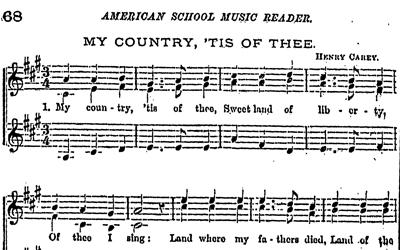
Description
"My Country, 'Tis of Thee" was written by Samuel Francis Smith, an American Baptist minister and writer. Also known as "America," the sheet music was written in 1874 and the audio recording was created in 1898.
Williams School in Brush, Colorado, October 27, 1915
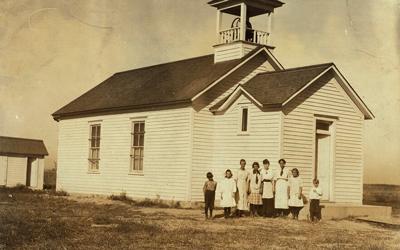
Description
This photograph of a one-room schoolhouse in Brush, Colorado, shows seven children and a teacher outside. Named the Williams School, the image shows a small portion of the expected 30 to 40 students expected when beet work in the fields was over. This photo was…
Schoolchildren on Circular Swing in San Augustine, Texas, April 1939
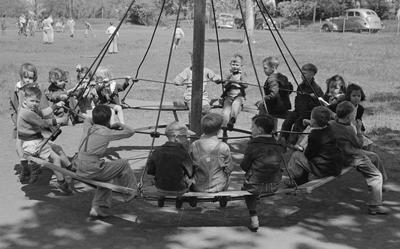
Description
This photograph shows schoolchildren on a circular swing in San Augustine, Texas. The image was taken by Russell Lee in 1939.
Lunch Hour at a Country School in Grundy Center, Iowa, October 1939
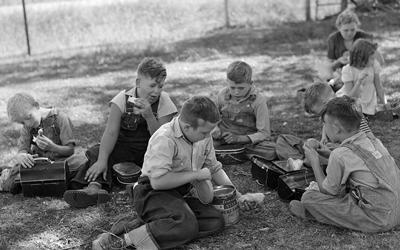
Description
The image shows a group of young students having their lunch outside at a country school in Grundy Center, Iowa. The photo was taken by Arthur Rothstein in 1939. Take a look at how this lunch hour compares to the student in the lunch line…
Students Recite "Pledge of Allegiance" in New York, January 1943, and Song Sheet, November 20, 1917
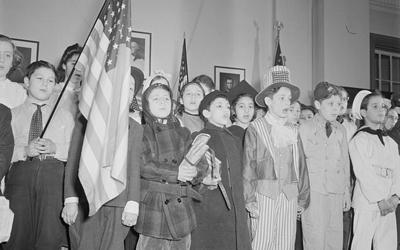
Description
The photograph, taken by Marjory Collins, is of New York City students reciting the "Pledge of Allegiance." The image was taken in January 1943 at New York Public School 8, which was in a predominantly Italian-American section of the city.
Iowa Public Television's "McGuffey’s Readers," 1979
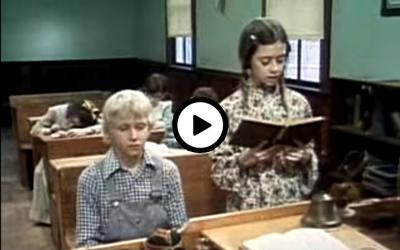
Description
McGuffey's Readers were the primary text used in schools to teach spelling, history, poetry, religion, morals and etiquette. It was from the pages of McGuffey’s Readers that such meaningful prose sprang forth. Eventually, six readers were published under the McGuffey name…
Iowa Public Television's "One-Room Schoolhouse," 1979
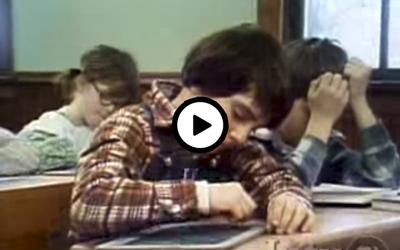
Description
This video shows the function of a one-room schoolhouse in Iowa. There were no grade levels in Iowa country schools, and one teacher taught up to 15 students of varying ages. But some had as few as two. When a student passed one lesson, he or she moved on to…
Children Going to School on a Horse-Drawn Bus in Keokuk County, Iowa, 1928
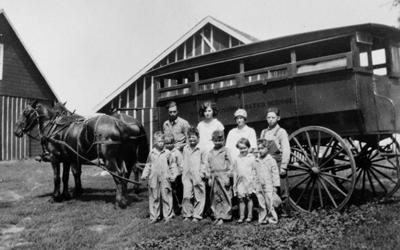
Description
The photograph shows children from Webster Consolidated School standing beside a horse-drawn bus. The image was taken in 1928 in Keokuk County, Iowa.
Classroom in West Virginia School, between 1935 and 1942
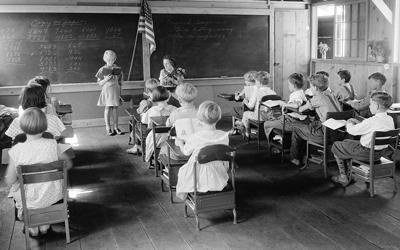
Description
This photograph is of a schoolhouse in West Virginia. The image was taken by Elmer Johnson sometime between 1935 and 1942.
An Integrated School in Washington, D.C., May 27, 1955
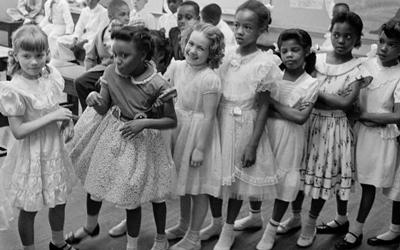
Description
This photograph by Thomas O'Halloran shows a line of African-American and white school girls standing in a classroom while the boys sit behind them. All are students at Barnard Elementary School in Washington, D.C., and they are in an integrated classroom in 1955. …
Third-Grade Class at Abraham Lincoln School #14 in Elizabeth, New Jersey, 1983
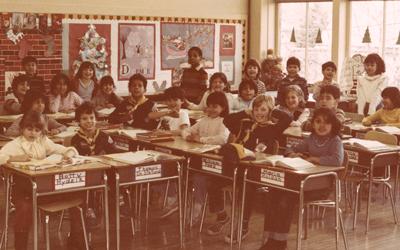
Description
This image, taken by an unknown photographer, shows the third-grade class of Jettie V. Spears Randolph. The photograph was taken at Abraham Lincoln Elementary School #14 in Elizabeth, New Jersey, in 1983. The back of the photo includes the following description: "Dear Rosa,…
Prairie Ridge Elementary School Cafeteria in Cedar Rapids, Iowa, February 2018
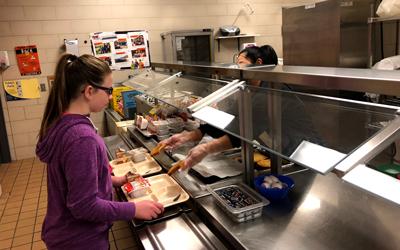
Description
The photograph shows the Prairie Ridge Elementary School cafeteria, where students are being served breakfast in February 2018. Meals are served to students from grades preschool through 4th grade. Take a look at how this lunch hour compares to the students at a…
Prairie Ridge Elementary Computer Lab in Cedar Rapids, Iowa, February 2018
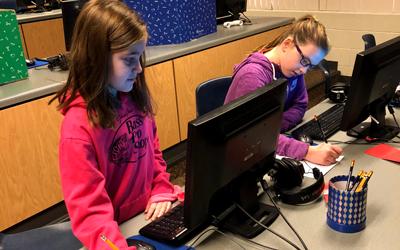
Description
The photograph shows two students from Prairie Ridge Elementary School in Cedar Rapids in their school's computer lab.
Lachung School in India, between 1965 and 1979
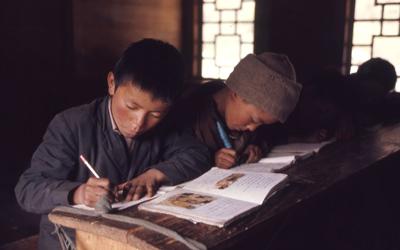
Description
The photograph shows young boys reading and writing in school. The image, which was taken by Alice Kandell, was based in Lachung, Sikkim - a state in northeast India.
School Children at the Paljor Namgyal Girls School in Sikkimm, India, January 1969
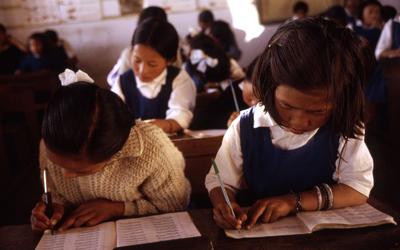
Description
This photograph, taken by Alice Kandell, shows school children at the Paljor Namgyal Girls School. This school, which was photographed in 1969, is in Sikkim, a state in northeast India.
Children in Art Class at a "Commune School" in China, 1979
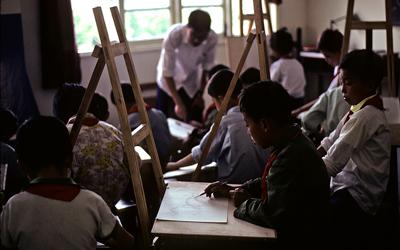
Description
The children photographed are learning to draw in an art class at a "commune school" in China in 1979. Communes in China were the largest collective units in rural areas of China from 1958 to 1983, when they were replaced by townships.
South Korean Students Completing an Assignment in Class, December 2017
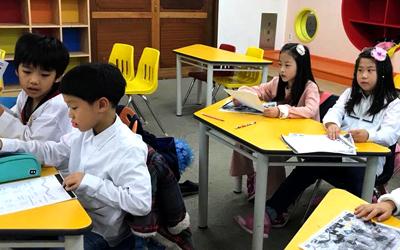
Description
South Korean students are shown using books in this photograph to complete an assignment in December 2017. The image was taken at Bongeun Elementary School.
First Graders Perform at Bongeun Elementary in South Korea, 2018
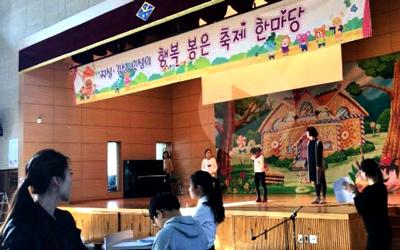
Description
The photograph by Jungsun Kim shows first grader students practicing a performance at Bongeun Elementary School. The image was taken in South Korea in 2018.
A School Playground in South Korea, 2018
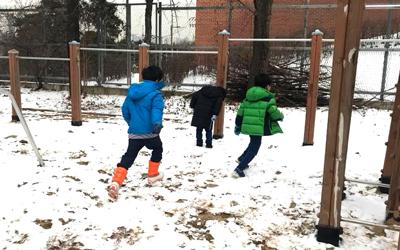
Description
The image shows students on a playground at Bongeun Elementary School in South Korea.
A First-Grade Classroom at Bongeun Elementary in South Korea, 2018
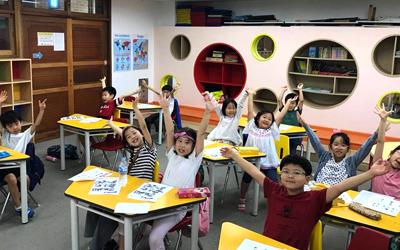
Description
The photograph shows a first-grade classroom at Bongeun Elementary School. The image was taken by Jungsun Kim in 2018.
First-Grade Students with Their Teacher at Bongeun Elementary in South Korea, 2018
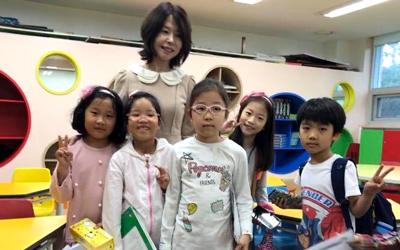
Description
First-grade students in South Korea are shown posing with their teacher at Bongeun Elementary School. The photograph was taken by Jungsun Kim in 2018.
Additional Resources:
- "One-Room Schoolhouses" ReadWorks Curriculum
This website provides non-fiction passages at a first-grade level with audio about one-room schoolhouses. You have to create a free account to view content. - "School: How Has it Changed" ReadWorks Curriculum
This website provides non-fiction passages at a first-grade level with audio about how schools have changed. You have to create a free account to view content. - This Is How We Do It: One Day In the Lives of Seven Kids Around the World by Matt Lamothe
This picture book follows one day in the real lives of seven kids from around the world — Italy, Japan, Iran, India, Peru, Uganda and Russia. - At School: Long Ago and Today by Lynette R. Brent
This book is an introduction to how education has changed in the past one hundred years, discussing how buildings and classrooms, books and lessons, recess and after school activities and ways of getting to school are different. - Exploring Cultures: South Korea by Derek Zobel
This book discusses South Korea's landscapes, the everyday life of its people and the country's history with North Korea.
Iowa Core Social Studies Standards (1st Grade)
Listed below are the Iowa Core Social Studies content anchor standards that are best reflected in this source set. The content standards applied to this set are elementary-age level and encompass the key disciplines that make up social studies for first grade students.
| No. | Standard Description |
| SS.1.8. | Identify students’ own cultural practices and those of others within the community and around the world. |
| SS.1.10. | Compare and contrast rules or laws within different communities and cultures. |
| SS.1.20. | Create a chronological sequence of multiple related events in the past and present using specific times. |
| SS.1.21. | Compare life in the past to life today within different communities and cultural groups, including indigenous communities. |
| SS.1.22. | Given context clues, develop a reasonable idea about who created a primary or secondary source, when they created it, where they created it, and why they created it. |